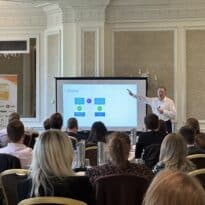With the deadline for online self-assessment looming, savers and investors should brace themselves for higher tax bills this year and the next, says AJ Bell.
Figures released by HM Revenue & Customs showed that over 24,800 people saw in the new year by filing their tax returns on 1 January. However, 5.4 million taxpayers are yet to file their return as the 31 January deadline approaches, in what is likely to be a “significantly more painful” process, says AJ Bell, with savers and investors facing higher tax bills on their bank interest, share dividends and capital gains.
During the tax year running from 6 April 2023 to 5 April 2024, interest rates hit their peak of 5.25%. While higher rates of interest were a positive development for savers, many will now have to think about the tax due on their interest payments.
Laith Khalaf, head of investment analysis at AJ Bell, said: “Nowadays, banks pay interest without any tax deductions, because of the personal savings allowance. This is £1,000 for basic rate taxpayers, £500 for higher rate taxpayers and £0 for additional rate taxpayers. When interest rates were close to zero, this meant most cash savers didn’t have to worry about a January tax bill.
“A higher rate taxpayer receiving an interest rate of 0.5% on their cash needed £100,000 sat in the bank to breach their personal savings allowance, during the days of ultra-low interest rates. If that rate has risen to 5% though, suddenly anything over £10,000 in a standard savings account starts to create a tax liability. For plenty of savers, the January 2025 tax return will be the first time they have reckoned with the tax implications of higher interest rates.”
Shareholders face a similar issue with their dividends, after the dividend allowance was slashed to £1,000 for the 2023/24 tax year.
“That means even more tax for those who hold dividend-paying portfolios outside of a tax shelter,” said Khalaf. “January 2026 will be even tougher because for the current tax year the dividend allowance has been halved again to just £500.”
Investors making gains on share sales will also face higher tax as a result of the cut to the capital gains tax allowance, which was drastically cut from £12,300 to £6,000 in the 2023-24 tax year.
Khalaf said: “Again there is more pain in the post, as this tax year the CGT allowance has been cut again, to just £3,000, so next January promises to be even more punitive for anyone with gains to report to the taxman. This will be amplified by the fact the chancellor has increased the rates of CGT on shares from 30 October 2024, to 18% for basic rate taxpayers and 24% for higher rate taxpayers.”
To help reduce the tax bill for next January, Khalaf said investors should consider making pension contributions and ISA subscriptions in this tax year, particularly higher rate or additional rate taxpayers.
“The January 2026 tax return might well feel like a problem for another day, but action now could really take the edge off what might otherwise prove to be a punishing tax bill this time next year,” he added.
Main image: studio-221wufG10eg-unsplash































